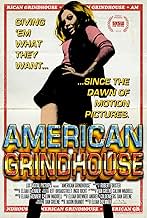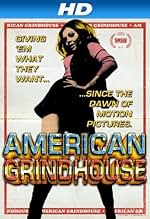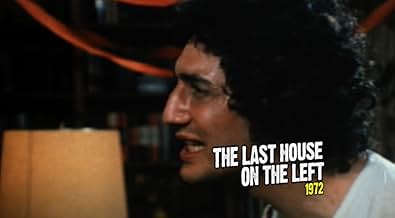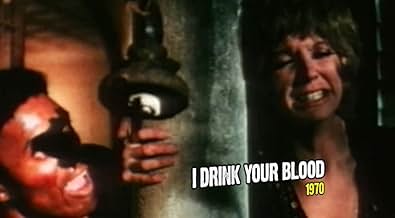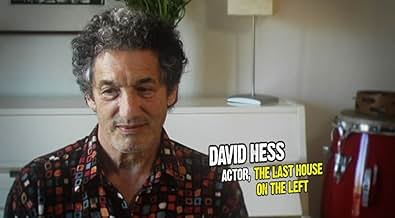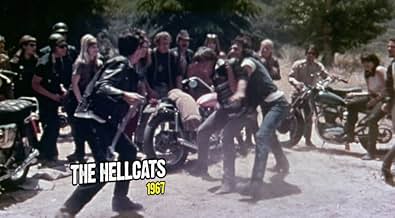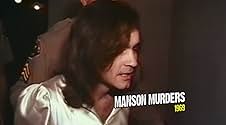IMDb-BEWERTUNG
7,1/10
2718
IHRE BEWERTUNG
Füge eine Handlung in deiner Sprache hinzuA documentary about the history of exploitation movies, from the silent-film era to the 1970s.A documentary about the history of exploitation movies, from the silent-film era to the 1970s.A documentary about the history of exploitation movies, from the silent-film era to the 1970s.
- Regie
- Drehbuch
- Hauptbesetzung
Robert Forster
- Self - Narrator
- (Synchronisation)
Empfohlene Bewertungen
American Grindhouse explores the exploitation genres from their inception with Thomas Edison all the way to now(though very briefly). Along the way we get candid, short interviews(more like blurbs) from the likes of John Landis, Joe Dante, Ted V. Mikels, and Herschell Gordon Lewis - just to mention a few. I found the approach, the interviews, and the clips to be very interesting though not much was given to any particular subject. Many faces that should have been on here are notably absent like Roger Corman and Quentin Tarrantino, but that in and of itself should not diminish this look at something that really only lately has received a bit more respect than it is generally accorded. I saw clips of films that I had no knowledge of and will now seek some of those titles out. This is a breezy look at the history of a side of film that gets ignored for having a reputation that the films are garbage. Some without a doubt are,but some are gems. I wish more time had been given to those films. Exploitation films when it is all said and done(can I lace any more clichés through this review?) have stood the test of time better than many, many "mainstream" films.
American Grindhouse (2010)
*** (out of 4)
This film begins with people debating on what a grindhouse film really is and after the release of the film GRINDHOUSE it seems like everyone was debating the true definition. This documentary, to me, covers pretty much everything that wasn't accepted by the mainstream. We cover a wide range of films starting with some early silents from Edison and then moving to Hollywood movies like FREAKS as well as trashier things like MANIAC, REEFER MADNESS and then going through other decades. Included are the "birth" films from the 40s, the nudist films of the 60s, the gore period starting with Herschell Gordon Lewis and then moving through the 70s with stuff like THE LAST HOUSE ON THE LEFT and the blaxploitation pictures. John Landis, William Lustig, Ted V. Mikels, Herschell Gordon Lewis, Joe Dante, Kim Morgan, Fred Olen Ray, Fred Williamson, Allison Anders, Larry Cohen, David Hess, Don Edmonds and Jack Hill are just a few of the people interviewed here and they too have a wide range of opinions on the films covered here. For the most part I think this is a terrific introduction to those unfamiliar with the genre but if you have a good idea of these films and their history then it's doubtful you're going to learn much here. I think American GRINDHOUSE would best be used as a training tool for those new movie fans wanting to see about this stuff and be able to see countless clips as well as get some nice recommendations for rentals. I think the documentary does a good job at covering various genres but at just 83-minutes there's really no way it can really dig deep into everything. Europeon films are pretty much overlooked and this is somewhat frustrating especially when certain films are made to appear as if they started a sub-genre when in fact it was usually something overseas. The film also does a nice job at showing how certain production rules in Hollywood is what helped change the exploitation filmmakers and how Hollywood eventually had to drop what they were doing and offer people what they wanted.
*** (out of 4)
This film begins with people debating on what a grindhouse film really is and after the release of the film GRINDHOUSE it seems like everyone was debating the true definition. This documentary, to me, covers pretty much everything that wasn't accepted by the mainstream. We cover a wide range of films starting with some early silents from Edison and then moving to Hollywood movies like FREAKS as well as trashier things like MANIAC, REEFER MADNESS and then going through other decades. Included are the "birth" films from the 40s, the nudist films of the 60s, the gore period starting with Herschell Gordon Lewis and then moving through the 70s with stuff like THE LAST HOUSE ON THE LEFT and the blaxploitation pictures. John Landis, William Lustig, Ted V. Mikels, Herschell Gordon Lewis, Joe Dante, Kim Morgan, Fred Olen Ray, Fred Williamson, Allison Anders, Larry Cohen, David Hess, Don Edmonds and Jack Hill are just a few of the people interviewed here and they too have a wide range of opinions on the films covered here. For the most part I think this is a terrific introduction to those unfamiliar with the genre but if you have a good idea of these films and their history then it's doubtful you're going to learn much here. I think American GRINDHOUSE would best be used as a training tool for those new movie fans wanting to see about this stuff and be able to see countless clips as well as get some nice recommendations for rentals. I think the documentary does a good job at covering various genres but at just 83-minutes there's really no way it can really dig deep into everything. Europeon films are pretty much overlooked and this is somewhat frustrating especially when certain films are made to appear as if they started a sub-genre when in fact it was usually something overseas. The film also does a nice job at showing how certain production rules in Hollywood is what helped change the exploitation filmmakers and how Hollywood eventually had to drop what they were doing and offer people what they wanted.
About as interesting as a loosely-related series of sparse conversations with cult-favorite directors is likely to get. The goal seems to have been the assembly of a "straight from the horse's mouth" oral history of exploitation at large in cinema, but none of the subjects could really nail down the outer limits of what the term meant. So, instead, it became a crash-course history of underground film, decorated at all corners with vaguely familiar old men reminiscing about their glory days. The narrative jumps all over the place, sometimes floating from the '20s to the '90s over the course of a single sentence - that's OK, though, because the sheer breadth of knowledge and a shared recollection of the crazy promotional stunts each film undertook to get noticed makes the journey worthwhile. It's also one hell of a Netflix recommendation engine.
'AMERICAN GRINDHOUSE': Four Stars (Out of Five)
A documentary on the history of exploitation films, which are as old as film itself. As the movie points out as soon as man had the power to keep a video recording of things the first thing we naturally wanted to do was record something exploitative. The film is directed by Elijah Drenner (in his feature film debut) and written by Drenner and Calum Waddell. It features interviews with such legendary exploitation filmmakers as John Landis, Joe Dante, Herschell Gordon Lewis, Jack Hill, Larry Cohen, Don Edmonds and many more. The film is narrated by Robert Forster.
The movie follows the history of exploitation film from the turn of the century, when film was invented, to present day and displays a decade by decade examination of it. It intercuts clips from various movies with interviews from different filmmakers, critics and actors discussing them. Some of the earlier clips are the most interesting and shocking. It examines the effects of various things on the industry, like the Motion Picture Production Code as well as the 'Grindhouse' theaters themselves. 'Grindhouse' theaters were movie theaters that almost solely showed exploitation films and usually stayed open all day and night. They were named after the run down burlesque theaters on 42nd Street in New York City. The film follows the history of 'Grindhouse' theaters and the exploitation film industry all the way to it's near extinction in the mid 70's when movies like Steven Spielberg's 'JAWS' finally blurred the lines between indie exploitation and Hollywood films and made exploitation 'B' movies a mainstream excepted thing.
The movie is extremely interesting and educational. It's also very entertaining and never dull. It moves at a remarkably fast pace and finishes in a very quick 80 minute running time. There are a few movies and filmmakers I'm surprised they never touched on, especially considering some of the ones they did, which makes me feel the film is not as complete a film history lesson as it could have been (but then again no movie possibly could be). It is only 80 minutes like I said and I'm sure there were budget restraints as well (It is a very low budget movie itself). The interviews are outstanding and the clips shown are as shocking and disturbing as any movie I've seen. Which makes you wonder if the documentary itself isn't exploitation filmmaking.
Watch our movie review show 'MOVIE TALK' at: http://www.youtube.com/watch?v=CcXJ6wkPwN0
A documentary on the history of exploitation films, which are as old as film itself. As the movie points out as soon as man had the power to keep a video recording of things the first thing we naturally wanted to do was record something exploitative. The film is directed by Elijah Drenner (in his feature film debut) and written by Drenner and Calum Waddell. It features interviews with such legendary exploitation filmmakers as John Landis, Joe Dante, Herschell Gordon Lewis, Jack Hill, Larry Cohen, Don Edmonds and many more. The film is narrated by Robert Forster.
The movie follows the history of exploitation film from the turn of the century, when film was invented, to present day and displays a decade by decade examination of it. It intercuts clips from various movies with interviews from different filmmakers, critics and actors discussing them. Some of the earlier clips are the most interesting and shocking. It examines the effects of various things on the industry, like the Motion Picture Production Code as well as the 'Grindhouse' theaters themselves. 'Grindhouse' theaters were movie theaters that almost solely showed exploitation films and usually stayed open all day and night. They were named after the run down burlesque theaters on 42nd Street in New York City. The film follows the history of 'Grindhouse' theaters and the exploitation film industry all the way to it's near extinction in the mid 70's when movies like Steven Spielberg's 'JAWS' finally blurred the lines between indie exploitation and Hollywood films and made exploitation 'B' movies a mainstream excepted thing.
The movie is extremely interesting and educational. It's also very entertaining and never dull. It moves at a remarkably fast pace and finishes in a very quick 80 minute running time. There are a few movies and filmmakers I'm surprised they never touched on, especially considering some of the ones they did, which makes me feel the film is not as complete a film history lesson as it could have been (but then again no movie possibly could be). It is only 80 minutes like I said and I'm sure there were budget restraints as well (It is a very low budget movie itself). The interviews are outstanding and the clips shown are as shocking and disturbing as any movie I've seen. Which makes you wonder if the documentary itself isn't exploitation filmmaking.
Watch our movie review show 'MOVIE TALK' at: http://www.youtube.com/watch?v=CcXJ6wkPwN0
This is a terrific documentary for fans of exploitation cinema and B movies. The documentary charts the history of US exploitation films from the beginnings of cinema to the modern day.
It was Tarantino and Rodriguez that revitalised the term Grindhouse when they made their double feature but it took off in the 1960s with the change of mores and loosening of censorship laws.
It allowed filmmakers to exploit and challenge an area of cinema that was designed for discerning adults that like terror, sex, violence and buckets of blood.
The documentary is narrated by Robert Forster and interviews starts, directors and fans of the genre including Joe Dante, John Landis, Fred Williamson, Larry Cohen, William Lustig, Lewis Teague and others.
However it is not just talking heads, you have clips from grindhouse films and especially a good representation of clips from films of the 1960s and 70s.
It was Tarantino and Rodriguez that revitalised the term Grindhouse when they made their double feature but it took off in the 1960s with the change of mores and loosening of censorship laws.
It allowed filmmakers to exploit and challenge an area of cinema that was designed for discerning adults that like terror, sex, violence and buckets of blood.
The documentary is narrated by Robert Forster and interviews starts, directors and fans of the genre including Joe Dante, John Landis, Fred Williamson, Larry Cohen, William Lustig, Lewis Teague and others.
However it is not just talking heads, you have clips from grindhouse films and especially a good representation of clips from films of the 1960s and 70s.
Wusstest du schon
- WissenswertesJohn Amero, Pam Grier, and Harry H. Novak were all approached to be interviewed in this documentary, but they all declined.
- VerbindungenFeatures Corbett and Courtney Before the Kinetograph (1894)
- SoundtracksThe Thieving Magpie Overture
composed by Gioachino Rossini
Top-Auswahl
Melde dich zum Bewerten an und greife auf die Watchlist für personalisierte Empfehlungen zu.
- How long is American Grindhouse?Powered by Alexa
Details
Box Office
- Bruttoertrag in den USA und Kanada
- 5.529 $
- Weltweiter Bruttoertrag
- 5.529 $
Zu dieser Seite beitragen
Bearbeitung vorschlagen oder fehlenden Inhalt hinzufügen

Oberste Lücke
By what name was American Grindhouse (2010) officially released in India in English?
Antwort

